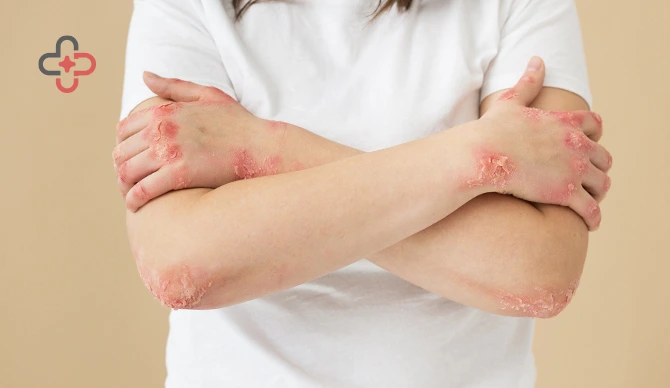A red rash, an itchy patch, or a painful bump—skin problems are easy to ignore at first, but did you know many of them are actually infections? Some clear up on their own, while others need medical attention. Most skin infections can be prevented with the right habits and timely care.
At Manhattan Primary Care, our board-certified physician, Dr. Syra Hanif, M.D., sees patients every day with skin concerns that range from mild rashes to serious bacterial infections. This guide will help you understand the most common types of skin infections, how to recognize their symptoms, and most importantly, how to protect yourself and your family.
What Are Skin Infections?
Skin infections occur when harmful microorganisms such as bacteria, viruses, fungi, or parasites invade the skin.
These infections may be:
- Mild and self-limiting (like athlete’s foot)
- Moderate requiring prescription creams or medications
- Severe with spreading redness, fever, or chronic infections that require urgent medical care
Common Types of Skin Infections
Bacterial Skin Infections
- Impetigo: common in children, causes red sores and honey-colored crusts.
- Cellulitis: deeper infection with redness, swelling, warmth, and pain.
- Folliculitis: inflammation of hair follicles, often after shaving.
- Boils: painful, pus-filled bumps.
Viral Skin Infections
- Herpes simplex: causes cold sores or genital blisters.
- Warts: caused by human papillomavirus (HPV).
- Molluscum contagiosum: small, raised bumps.
Fungal Infections
- Athlete’s foot: itching and scaling between toes.
- Ringworm: circular, scaly rash.
- Yeast infections: affect warm, moist areas. This is especially relevant to women’s health.
Parasitic Infections
- Scabies: mites burrowing into skin, causing intense itching.
- Lice: infest hair and cause itching.
Skin Infection Symptoms
- Redness, swelling, pain, or warmth at the site
- Pus, blisters, or sores
- Persistent itching or burning sensations
- Fever, fatigue, or spreading rash in severe cases
Viral vs Bacterial: How to Tell the Difference
Bacterial infections:
- Often produces pus
- Localized redness, pain, and swelling
Viral infections:
- More widespread
- May cause blisters or warts
Important: Only a doctor’s exam or lab services can confirm the cause.
Which Skin Infections Are Contagious?
Highly contagious infections include:
- Impetigo
- Ringworm
- Scabies
- Herpes
- Warts
They spread through direct contact, shared personal items, or poor hygiene. Prevention is key: avoid sharing towels or razors and practice good hygiene.
How to Prevent Skin Infections
- Hygiene: wash hands often, shower after exercise, avoid sharing personal items (important for athletes)
- Wound care: clean and cover cuts or scrapes promptly
- Skin barrier health: moisturize regularly to prevent cracks and dryness
- Lifestyle: eat a balanced diet, exercise, and get adequate sleep to support immunity. Consider routine preventive care and health screenings to stay ahead of infections.
- Vaccination: Certain vaccines like shingles or HPV can lower risks; see our immunization & vaccines page.
Skin Infection Treatment Options
- Mild infections: topical creams, antifungal powders, home remedies like warm compresses
- Moderate to severe infections: prescription antibiotics, antivirals, or antifungals
- Emergency signs: spreading redness, fever, or severe pain—seek medical care immediately.
We offer same-day visits for acute illness and convenient telehealth services if you can’t come in person.
Conclusion
Most skin infections are preventable with good hygiene and healthy skin practices. Recognizing symptoms early can stop minor issues from turning into serious problems. Understanding whether your skin problem is bacterial, viral, or fungal helps guide the right treatment.
If you notice a rash, sore, or persistent skin irritation that doesn’t improve, don’t ignore it. At Manhattan Primary Care, our doctors provide expert diagnosis and treatment to keep your skin and overall health protected. Book an appointment today and take the first step toward healthier skin.
Frequently Asked Questions
Can stress make me more prone to skin infections?
Yes. Chronic stress weakens your immune system, making your skin less able to fight off bacteria, fungi, or viruses.
Are skin infections more common in certain seasons?
Yes. Warm, humid weather often increases fungal infections like athlete’s foot, while cold, dry weather can crack skin and increase bacterial risks.
Can wearing tight clothing lead to skin infections?
It can. Tight or non-breathable fabrics trap moisture and heat, encouraging fungal or bacterial growth.
Do pets carry skin infections that humans can catch?
Some do. Ringworm, for example, can be transmitted from cats or dogs to people through direct contact.
Is it possible to get a skin infection after a cosmetic procedure?
Yes. Even minor procedures like waxing or cosmetic injections carry a small risk of infection if aftercare or hygiene isn’t followed properly.
Sources
- Memorial Care – Common Skin infections and How to Prevent Them
- New York State – What is the most important way to prevent the spread of skin infections
- Health Line – What To Know About Skin Infections
- Angeline Yong Dermatology – 5 Common Skin Infections And How To Prevent Them Safely
Disclaimer
This blog is for informational & educational purposes only and does not intend to substitute any professional medical advice or consultation. For any health-related concerns, please consult with your physician, or call 911.
